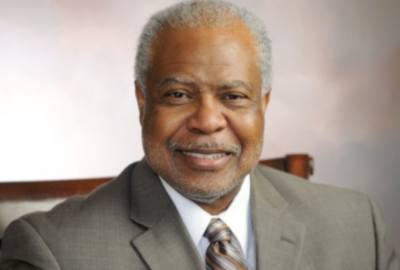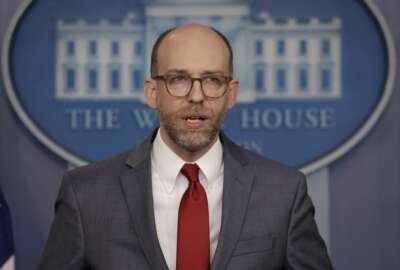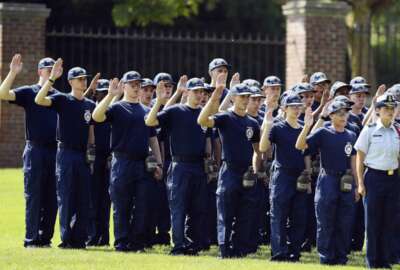
Latest winner of Meritorious Service Award for the Coast Guard
The Coast Guard often singles out members who have made outstanding contributions. A case in point is the winner of the Meritorious Service Award, Lt. Tanesha...
Best listening experience is on Chrome, Firefox or Safari. Subscribe to Federal Drive’s daily audio interviews on Apple Podcasts or PodcastOne.
Unlike the other military services, the Coast Guard often singles out members who have made outstanding contributions. Sometimes they showcase people receiving recognition from outside organizations. A case in point is my next guest, she has received the Meritorious Service Award for the Coast Guard from Blacks In Government (BIG). Lt. Tanesha Green-Baker joined Federal Drive with Tom Temin for more discussion.
Interview transcript:
Tom Temin: Lt. Green-Baker, good to have you on.
Tanesha Green-Baker: Thanks for having me, Tom.
Tom Temin: Tell us about yourself – you are an intelligence officer and tell us about the work that you do for the Coast Guard.
Tanesha Green-Baker: I’m currently an analyst in the Coast Guard where I focus on trends that inform our senior leaderships, and provide them with decision advantage. So we essentially inform the commandant on, what are emerging trends that he should be focusing on that will then inform his decisions on where cutters should be placed, where we should be doing our patrols and deployments and that sort of thing.
Tom Temin: And to the extent that you can tell us what types of data, what types of sources you look at, what is it you’re looking out for that might affect the Coast Guard?
Tanesha Green-Baker: I can’t go into too much detail just because it’s fairly classified and need-to-know but we do look at different trends on what types of vessels are coming into our waters, what other countries are doing in the Arctic regions, and essentially, those types of things where the Coast Guard wants to have a stake in the pot. We try and make sure that we’re informed and we’re best positioning ourselves to compete with our foreign adversaries.
Tom Temin: And are there some times when you have spotted something or became aware of something that resulted in – golly, we’ve got to do an operational change here, or we’ve got to take some action?
Tanesha Green-Baker: So for my portfolio, not presently. My portfolio deals with foreign ports. I look at different trends on what, any potential threats that could be coming to the U.S. from foreign ships. To that regard, I’m providing the commandant with knowledge on “Sir, if we accept these vessels from foreign countries, this is a risk that it could potentially pose our own national security.” So those types of things, just keeping the commandant informed.
Tom Temin: And how did you get into this type of work? Because the Coast Guard encompasses quite a number of potential jobs.
Tanesha Green-Baker: I’ve always wanted to do some form of intelligence work. So when I first joined the Coast Guard, I had no idea that I would go down this path. I originally joined back in 2015. And my first assignment was on a cutter so it was a 210 foot cutter down in mayport, Florida, where I was a deckwatch officer. And I enjoyed my time out there. We did a lot of interdictions, got a lot of drugs, saved migrants who were out on sea on unsafe vessels. So it’s pretty awesome. But it was tiring at the same time. So I said, you know what, I want to kind of get back on land for a bit and kind of exercise my operational experience and marry it with, you know, the intelligence that feeds the operation. So I figured I would go into the intel side of the house and learn how the information that the operations acted on, how that is fed into the whole grand scheme of things. So that’s how I came into the intel community.
Tom Temin: But you did get your salty brine spray chops at the same time?
Tanesha Green-Baker: Yes, I did. I’ve gone through the Panama Canal about four times. I’ve got the order of the ditch, Shellback sailors. So lots of fun things out there at sea.
Tom Temin: Now the big award that was cited by the Coast Guard mentions your work in COVID-19 research and helping the Coast Guard with its response to the pandemic. Tell us more about that.
Tanesha Green-Baker: Essentially, what I did there was we looked at predictive analysis, and we tried to figure out what are the different impacts of the coronavirus on areas of interest to the Coast Guard. So the cruise industry, you know, what is it going to do to the shipping lanes. And essentially, I was in charge of an analytic cell that reviewed different documents from different inner agencies that wanted our perspective and input on what they were writing on. So essentially, we served as an oversight group that reviewed all of the documents and before it was released, or or published, we made sure that what was written, made sense and aligned with what we’ve been seeing.
Tom Temin: We’re speaking with Coaast Guard Lt. Tanesha Green-Baker, who is a recipient of the Meritorious Service Award from Blacks In Government. And something else people should know about you is that you were a White House social aide and had some pretty good experiences there. Tell us about those.
Tanesha Green-Baker: Yes, so I’m currently a White House socially, which is a volunteer program, but it’s highly selective so you can volunteer but you go through a series of interviews with the White House and your own military branch. So it’s open to all O2s – O2 through O4 ranks in all branches of the service that are currently members who are in the National Capital Region. So essentially, my job was to assist the White House social secretary in supporting the president and first lady during their White House functions. And during my time there, I probably assisted over 6,000 guests of the president, making sure they have maximum enjoyment while visiting the White House. So I’ve assisted on different Medal of Honor events, state arrival of the Italian government, holiday receptions. And then I think my most recent one was the Nationals when they came to visit after the World Series. And my job as a White House social aide, is to ensure that the guests are enjoying their time, they know where the different rooms are maintaining flow of traffic, greeting the guests, and just ensuring that they’re having the best possible time so that when they leave the White House, they leave with a great taste in their mouth. And as a White House social aide, we steer away from discussing any political topics, even if they seem innocent, so we don’t have a stance in any political matters, it’s mainly there to serve as representative of the president to ensure that they’re having the best time that they can at the White House.
Tom Temin: Well, the last time I was in the White House, I had walked a few blocks in the heat and I couldn’t find a water fountain anywhere. So are there water fountains in the White House?
Tanesha Green-Baker: There are no water fountains in the White House that are open to the guests. So you can find normally at these events, there is a butler is walking around with water in the cup, so there are no actual water fountains unfortunately.
Tom Temin: Okay, well, I wasn’t quite a guest, I was more in the walled-off people with cameras and microphones. And I wanted to ask you also, since this award came from Blacks In Government, what has been your experience as a Black woman, a young woman coming up through the ranks to lieutenant? Because we’ve heard, you know, mixed experiences that people have had.
Tanesha Green-Baker: My experience has been largely very positive. And I think it’s because, and I know this isn’t the status quo for all Black members in the services, but I think because of my rank, I think I’m shielded and I’m due the respect of an officer. I think that kind of shields me a lot from some of the, I guess, racial issues I would face if I was enlisted. So I will say, there are times when as a Black woman in the Coast Guard, I often have to think about my role and what my presence in a room does. Essentially, what I mean by that is, when there are heated conversations going on or instances where they’d like my opinion, I have to be very careful on how I give my opinion. Because I know that as a Black woman, there are certain stereotypes with how we can come off as being aggressive or the “angry Black woman.” So I have to always make sure that I’m presenting myself in a way that’s, you know, non-threatening and making sure that it’s coming off as essentially very neutral. And then also, and this may just be an internal problem for myself but I think a lot of times I wonder if my own merit is being questioned, like how did she get here? Is it because of, you know, affirmative action or whatever program she got in through? Because I actually joined through the college student pre-commissioning initiative, which is the Coast Guard’s only scholarship program, and it targets minority-serving institutions. So I went to Spelman College, which is a historically Black college. And oftentimes, I wonder if, you know, my colleagues that are in the room are wondering, okay, well, she’s only here because, you know, we’re trying to meet a quota or whatever. So, sometimes I think those questions of what is she actually doing here kind of pop up. So largely, my experience in the Coast Guard has been fantastic. I have not personally been affected by any issues of racial inequality. It’s been pretty fair and equitable. And I will say the Coast Guard is, I guess, a leading change agent in the aspect of diversity and inclusion, and as evidenced through just their CSPI program, which is how I was recruited in.
Tom Temin: Well, we wish you luck in your future career. Coast Guard Lt. Tanesha Green-Baker received the Meritorious Service Award from Blacks In Government. Thanks so much for joining me.
Tanesha Green-Baker: Thank you for having me, it was an honor.
Tom Temin: We’ll post this interview along with a link to more information at FederalNewsNetwork.com/FederalDrive. Hear the Federal Drive on demand. Subscribe at Apple Podcasts or Podcastone.
Copyright © 2025 Federal News Network. All rights reserved. This website is not intended for users located within the European Economic Area.
Tom Temin is host of the Federal Drive and has been providing insight on federal technology and management issues for more than 30 years.
Follow @tteminWFED






